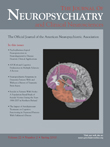Neuroleptic Malignant Syndrome Following Levomepromazine Discontinuation
To the Editor: We report herein the case of neuroleptic malignant syndrome following levomepromazine discontinuation.
Case Report
A 37-year-old man with a diagnosis of mental retardation and profound intellectual impairment (IQ<35) was admitted to a psychiatric hospital at the age of 22 for the first time due to insomnia, psychomotor agitation, and persecutory delusions. The patient had been maintained on a daily dose of approximately 600 mg carbamazepine and 50 mg/day of levomepromazine for several years. Five months prior to his admission, the patient`s medication was switched from carbamazepine to valproate, 300 mg/day, with 75 mg/day of levomepromazine because of his agitated behavior with high tension. Eight days prior to his admission, he had a fever due to common cold with loss of appetite, and the levomepromazine was discontinued. After taking the valproate for several days, the patient had high fever and was obtunded with muscle rigidity. When the patient was admitted to a psychiatry department, he had gait disturbance, severe muscle rigidity, and high fever (37.6°C). On the third day of admission, he had high pulse rate (96 bpm) and severe extrapyramidal symptoms. His fever elevated to 38.8°C, and laboratory tests showed an elevation of CPK (2861 IU/liter) and a high leukocyte level (11.5×109/liter). The brain CT scan showed no remarkable change, and the possibility of infectious disease was excluded. The patient was diagnosed with neuroleptic malignant syndrome. The patient received dantrolene treatment. On the 20th day, the fever disappeared and the serum CPK levels were normalized (109 IU/liter).
Discussion
This case report shows that neuroleptic malignant syndrome (NMS) can occur during valproate treatment and after the discontinuation of levomepromazine. Valproate was reported to be effective for treating the symptoms of NMS. 1 The unusual response of the patient is probably due to levomepromazine withdrawal. In a case of NMS after an abrupt clozapine withdrawal, cholinergic rebound was supposed to have occurred. 2 Cholinergic overdrive has an important role in the appearance of withdrawal symptoms and also might be a risk factor for the development of NMS. Another important issue to be mentioned in this case is mental retardation, which is one of the risk factors of NMS. 3 Several risk factors for NMS should be taken into account in cases involving mentally retarded patients whose symptoms often include dehydration, agitation, malnutrition, and exhaustion. Special caution with regard to patients who have risk factors of NMS is therefore necessary, not only in the administration of antipsychotic drugs but also in the discontinuation of such medications.
1. Tadke RR, Suryavanshi P: Use of intravenous valproate in a patient with neuroleptic malignant syndrome. J Neuropsychiatry Clin Neurosci 2006; 18:131–132Google Scholar
2. Margetic B, Aukst-Margetic B: Neuroleptic malignant syndrome and clozapine withdrawal at the same time? Prog Neuropsychopharmacol Biol Psychiatry 2005; 29:145–147Google Scholar
3. Viejo LF, Morales V, Punal P, et al: Risk factors in neuroleptic malignant syndrome: a case-control study. Acta Psychiatr Scand 2003; 107:45–49Google Scholar



